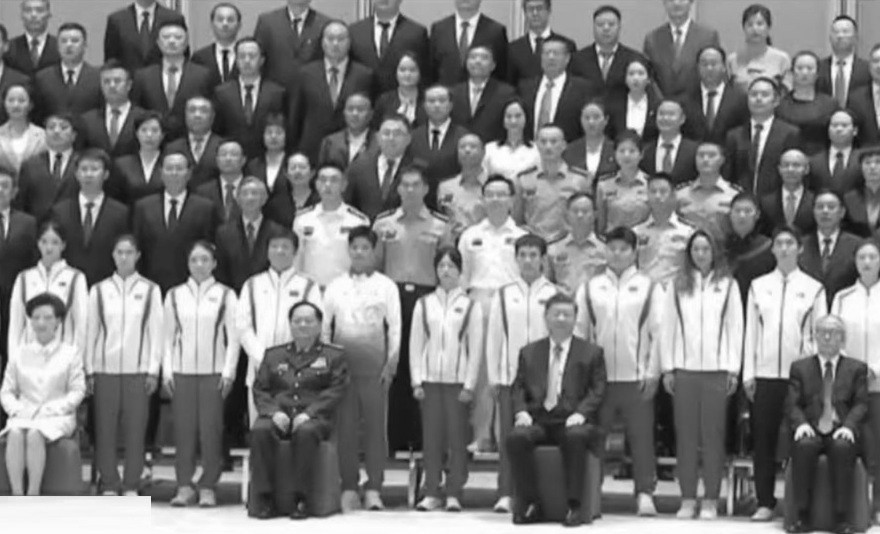On November 9, Xi Jinping and Zhang Youxia met with representatives of advanced national sports in Guangzhou.(Video screenshot)
[People News] Before the CCP’s Fourth Plenum of the 20th Central Committee convened, there were widespread rumors that Xi Jinping’s power was unstable. At the plenum, many high-ranking generals promoted by Xi were disciplined, but his own position did not change, and the military continued expressing loyalty to him afterward. However, some still believe the purge itself shows Xi is in a power crisis, that elder factions are applying “implicit checks and balances,” and that in the power reshuffle at the 21st Party Congress two years from now, Xi will find it difficult to secure another term.
Former Taiwanese DPP Chairman Hsu Hsin-liang said on November 14 that although Xi seems to have further consolidated his power through a large-scale purge, the reality may be exactly the opposite: Xi’s ability to control the military has clearly declined.
According to Taiwan media newtalk, Hsu Hsin-liang pointed out that most of the generals recently disciplined were Xi Jinping’s own core appointees. Under normal circumstances, a leader would not massively purge his own loyalists. “Such abnormal actions usually mean the system has developed problems and the military’s trust in the leader is loosening.” He essentially believes Xi’s control of the military has slipped.
At the Fourth Plenum, CMC member Zhang Shengmin was promoted to vice chairman of the Central Military Commission but did not receive a Politburo seat. Xi Jinping remains CMC chairman, and Zhang Youxia is the only Politburo member from the military.
Hsu Hsin-liang believes all factions within the CCP, including the elders, do not want to see a scenario where the military seizes power. “The elders don’t like Xi Jinping, but they are even more unwilling to see the military intervene in politics, because a military coup would cause the Communist Party to collapse immediately, and all factions would pay the price.” He believes that under such high-risk circumstances, all sides prefer to maintain surface-level stability to avoid losing control.
After the Fourth Plenum, both CMC vice chairmen Zhang Youxia and Zhang Shengmin made public declarations of loyalty to Xi. On November 12, Zhang Youxia even published an article in Party media calling for “彻底肃清流毒积弊” (“completely cleansing residual poison and chronic ailments”), and preventing being “two-faced” or engaging in fake loyalty.
Hsu Hsin-liang believes China is no longer in a “warlord era” like during the civil war. Due to the institutionalized nature of the modern military, officers lack both the ability and opportunity to stage a coup. Therefore, although Xi’s control over the military is weakening, it will not immediately lead to a military takeover, but Xi’s standing within the Party will gradually erode.
Hsu also believes that although CCP elders no longer intervene publicly, they still have the ability to exert “implicit checks and balances” on major personnel and policy matters. Under Xi Jinping’s highly repressive rule, these forces are re-consolidating and may play key roles in the coming years.
He believes that due to internal and external pressures, “Xi Jinping cannot be re-elected again at the 21st Party Congress in 2027,” and the future may shift back toward a structure closer to collective leadership. Xi stepping down may not necessarily cause chaos and may even bring an opportunity for institutional reforms or democratization in China, because more and more forces within the CCP already realize that if the next leader goes down the path of dictatorship again, the Party will repeat the same mistakes.
“Don’t assume China cannot move toward democracy; I believe the opportunity will be even greater after Xi Jinping,” he said.
Former Central Party School professor Cai Xia also said earlier on her media program Fangfei Time that at the Fourth Plenum, Xi and Zhang Youxia temporarily reached a “terror-balance” in which “neither side can completely defeat the other, so they must temporarily coexist.”
Australian scholar Yuan Hongbing, who frequently reveals inside information about CCP high-level movements, told overseas media “Kan Zhongguo” that among the CCP’s princeling (second-generation red) class, only two forces truly possess the will and desire to confront Xi Jinping. One is the faction represented by the Deng Xiaoping family, which wants to restore the power-elite capitalism of the Deng era. The other is Hu Yaobang’s eldest son Hu Deping, along with Hu Yaobang’s old subordinates and a large group of intellectuals influenced by Hu Yaobang’s thought. They hope to restore the liberal line of the Hu Yaobang period and ultimately achieve political reform.
Yuan Hongbing stated that these two forces are now preparing to present their political demands at the CCP’s 21st Party Congress. How much they can influence the development of the political situation remains to be seen.
Yuan Hongbing previously told The Dajiyuan, citing sources, that the two factions mentioned above are preparing major political documents, expected to be released publicly before 2026. Their goal is to “prevent Xi Jinping from securing another term at the 21st Party Congress” and attempt to seize the dominant position in setting the political line.
(Dajiyuan) △











News magazine bootstrap themes!
I like this themes, fast loading and look profesional
Thank you Carlos!
You're welcome!
Please support me with give positive rating!
Yes Sure!